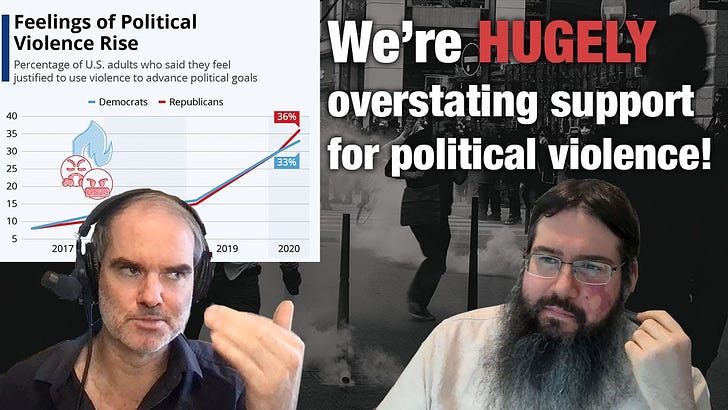Many people hugely overstate Americans' support for political violence — and it's frustrating
A talk with polarization researcher Sean Westwood
I recently had a talk with Sean Westwood, Director of the Polarization Research Lab and someone who I think has done some of the more important research on polarization. A 2022 paper he and his team worked on was titled, “Current research overstates American support for political violence.” In there they wrote that “existing estimates of support for partisan violence is nearly 6 times larger than the median of our estimates (18.5% versus 2.9%).”
And yet the narrative that there is a huge support for political violence in America is all around us (and I include some headline examples at the start of this episode). Honestly, I get pretty frustrated when I see yet another influential person speaking as if there’s high support for political violence. There are just so many downsides and risks to speaking in highly confident and highly pessimistic ways about such things. Fear and anger beget more fear and anger; and extremists can believe there is more support for their extreme, militant behavior than there is. In several ways, there can be a self-reinforcing cycle dynamic, and we talk about that, too: the self-fulfilling prophecy aspect.
The talk we had is here:
The importance of criticizing divisive stuff on “our side”
mentioned me in a piece about the importance of criticizing “your side.” I think that topic is very important — because our instincts to avoid criticizing “our side” is a major factor in making conflict grow more extreme and toxic. The people who want to bring down the temperature stay quiet (or lose power), and so temperatures inevitably rise. I’ve been in contact with Tamar Saguy, who worked on what I think is a very important paper related to this: “Exposure to Outgroup Members Criticizing Their Own Group Facilitates Intergroup Openness.” I don’t think the importance of criticizing one’s peers is discussed enough. You can hardly find anything about it online. Hardly anyone thinks about it or writes about it. I think Tamar will talk to me soon about this topic for the podcast. Getting a few more resources online about these ideas is important.




Have you talked to Robb Willer of Stanford on polarization yet?